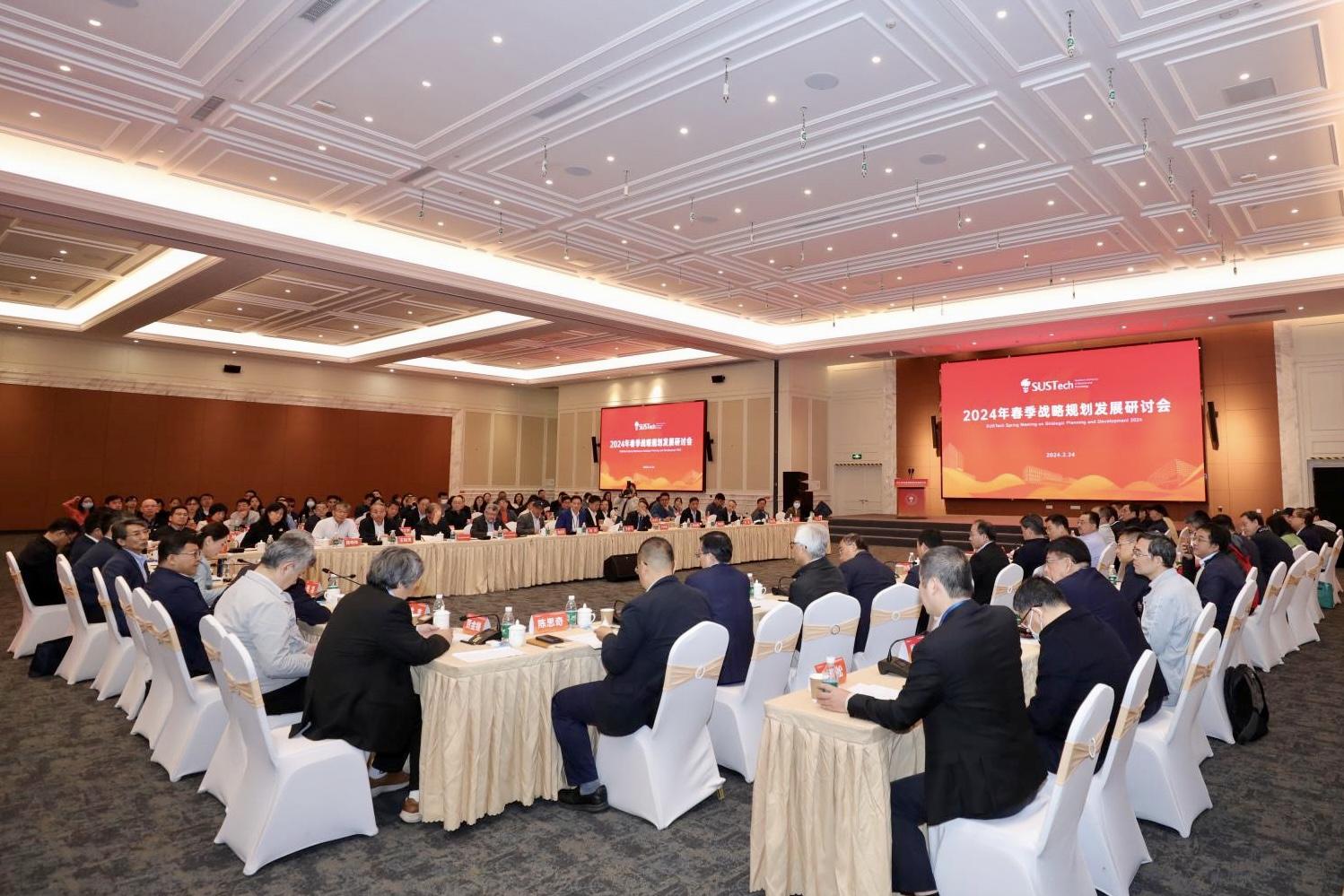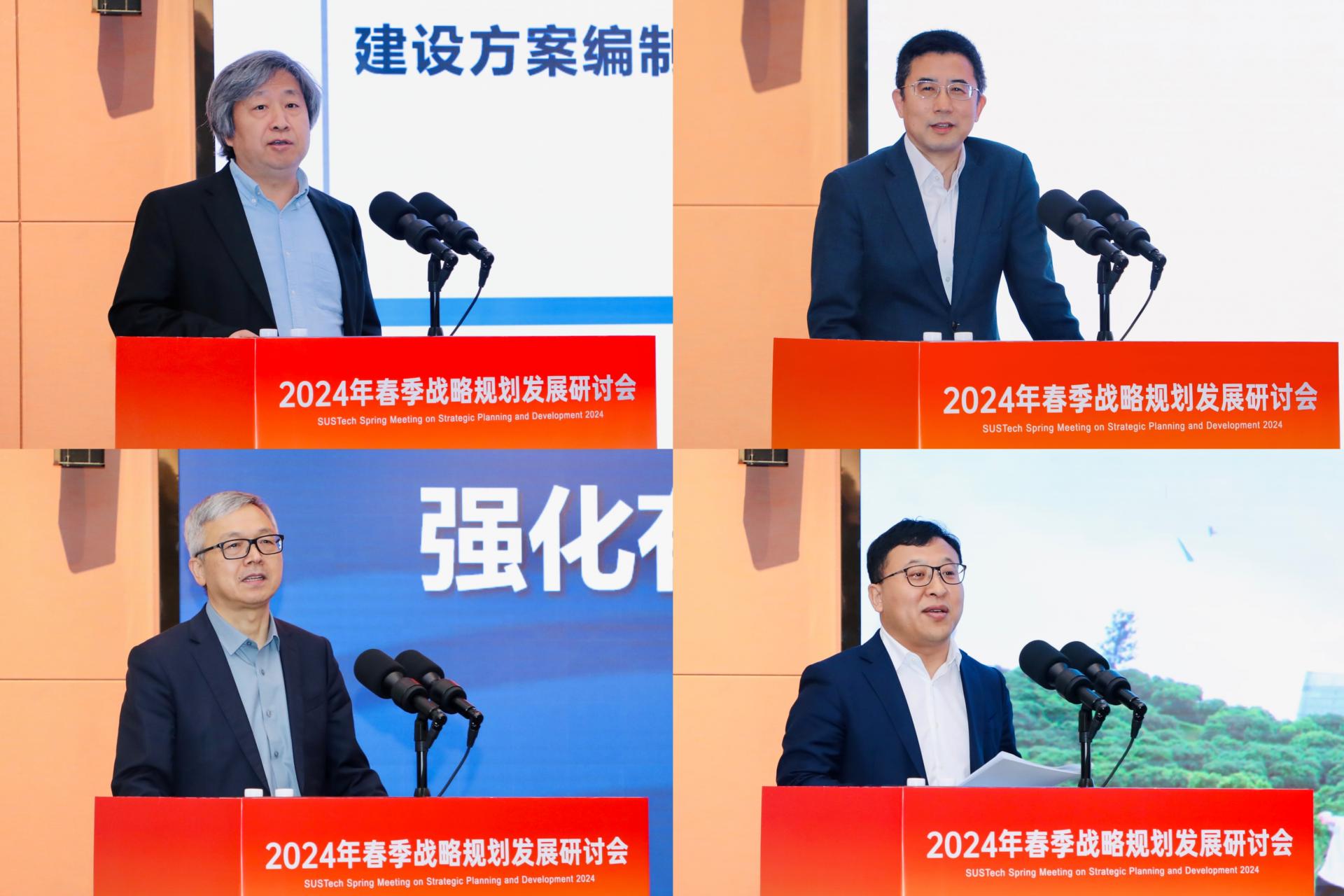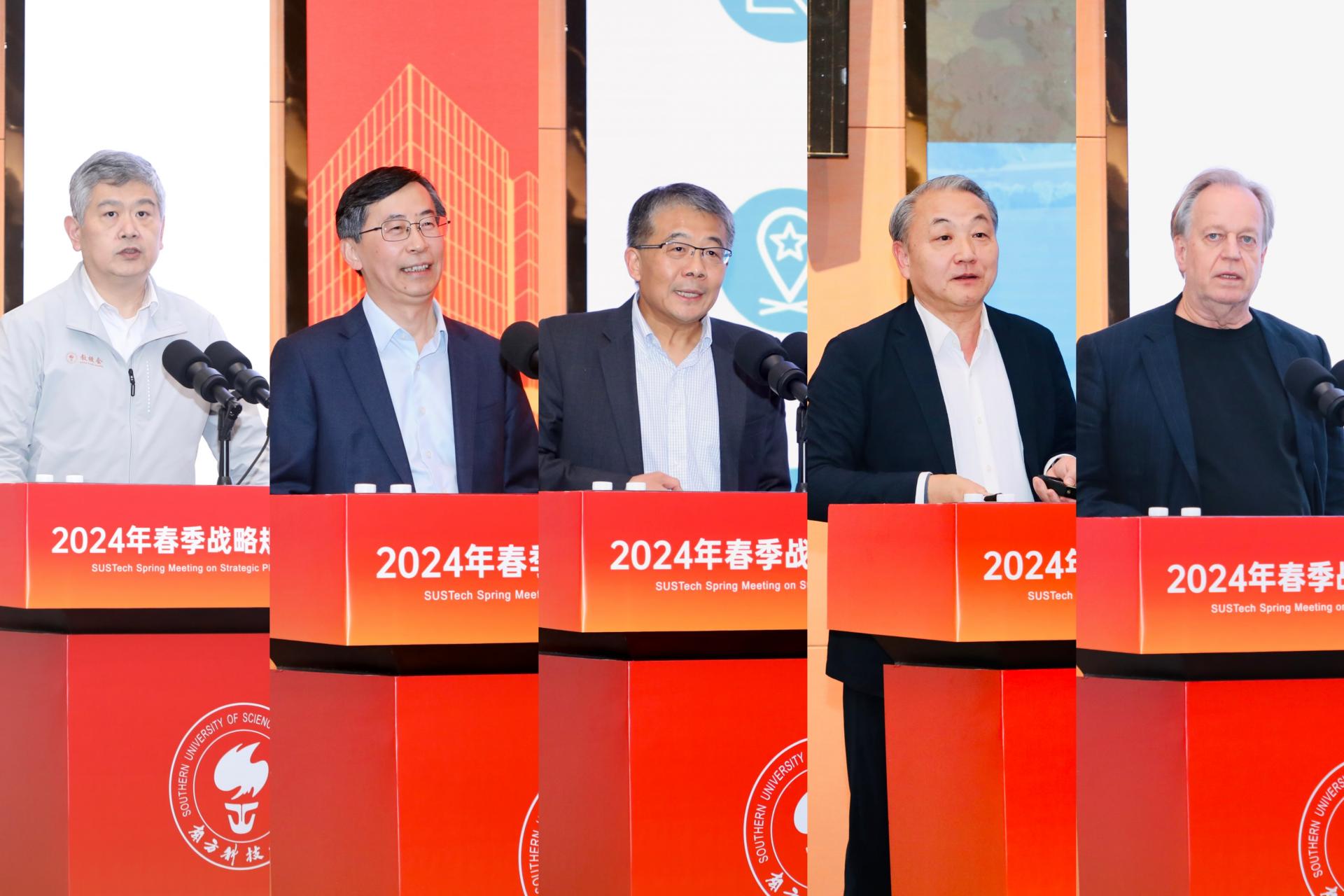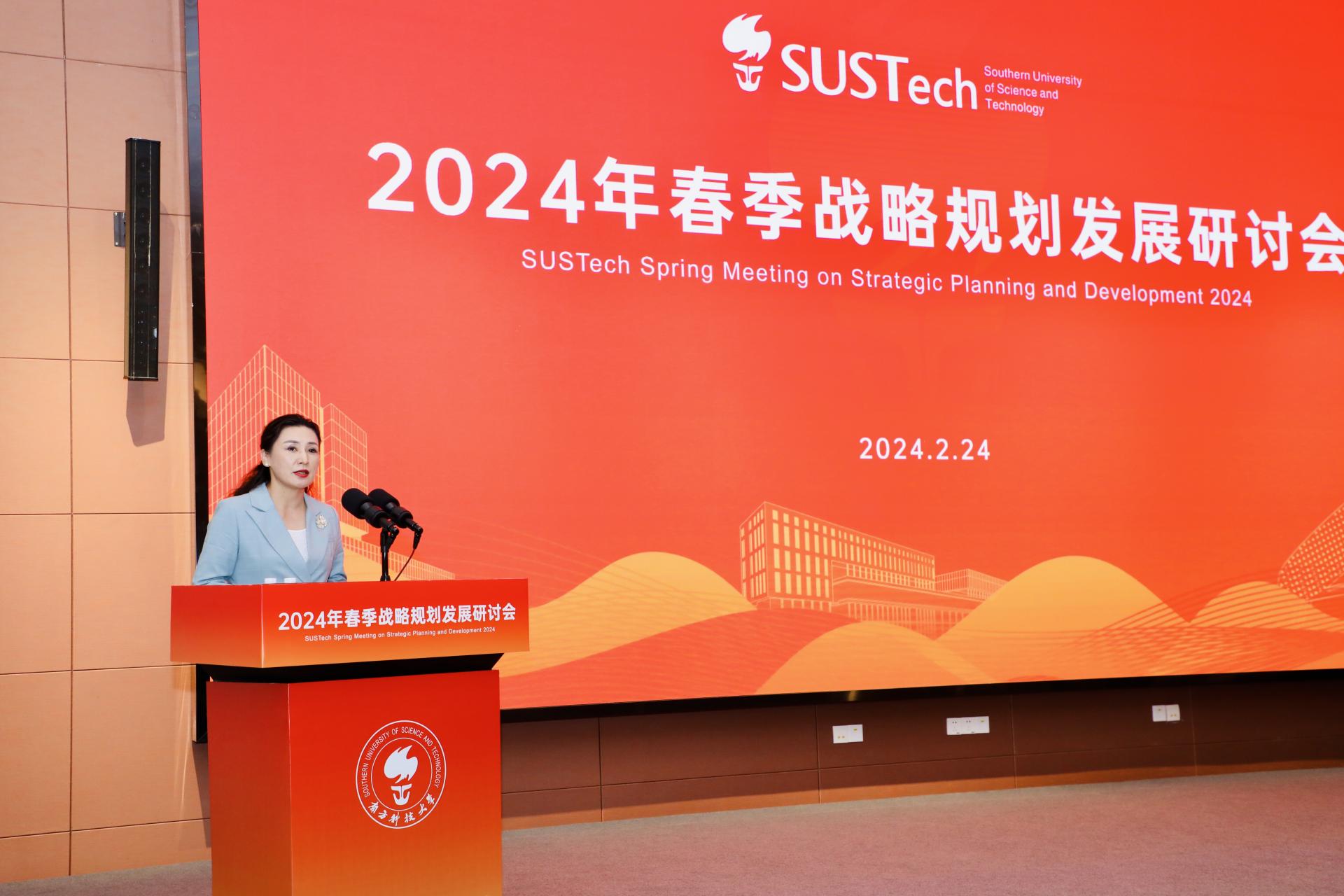On February 24, the Southern University of Science and Technology (SUSTech) convened its annual Spring Meeting on Strategic Planning and Development 2024.
Hong JIANG, University Council Chairperson, Qikun XUE, President of SUSTech, alongside other members of the University’s leadership team, as well as heads and representatives from related departments and colleges, attended the meeting.

The meeting highlighted the critical need to advance high-quality development and promote SUSTech’s “Double First-Class” construction, along with the release of practical measures to achieve these goals. Emphasis was placed on implementing the University’s “335” strategy and making substantial contributions to the nation’s development.

President Qikun XUE addressed the implementation of the “335” strategy and the advancement of the “Double First-Class” construction, emphasizing the detailed work plan for achieving the initial phase of the medium- and long-term strategic objectives.
Additionally, President XUE delineated a strategic blueprint for the upcoming year aimed at elevating SUSTech’s standing as a “Double First-Class” university. He commenced with a thorough analysis of SUSTech’s accomplishments and identified areas for enhancement encompassing faculty development, talent cultivation, curriculum refinement, scientific research, infrastructure for large-scale scientific endeavors, collaboration between academia and industry, global outreach, governance framework, campus ethos, and fundamental education.
He highlighted the analogy between a university devoid of a spiritual core and a soulless individual, underscoring the significance of adhering to the University’s motto of “Virtue, Truth, Advance”. He urged all members to join in the collective effort to nurture SUSTech into a prestigious and spiritually fulfilling institution with a far-reaching global influence.

Subsequent keynote reports by other members of the University’s leadership team delved into various topics, covering organizational effectiveness, talent cultivation, scientific research, and disciplinary advancement.
Jinfeng JIA, Acting Vice President, delivered a report on the University’s “Double First-Class” objectives, emphasizing the strategic focus on key areas, bolstering organizational structures, and optimizing resource allocation. He particularly underlined the significance of fostering inter-departmental collaboration to ensure the high-quality completion of tasks.
Hongwei FANG, Vice President and Provost, elucidated on talent development and the establishment of an engineering graduate training system. He outlined a series of measures aimed at accelerating the high-quality development of talent training at SUSTech.
Xueming YANG, Vice President of SUSTech, discussed plans for deploying and carrying out organized scientific research and the reform of the scientific research system. He introduced an implementation plan designed to streamline research activities and enhance the efficiency of the scientific research process.
Ling ZHANG, University Council Vice-Chairperson, emphasized the significance of the residential college system in cultivating high-level innovative talents. He elaborated on the directions and measures for further reforming the residential college system at SUSTech, underscoring the crucial role of education in nurturing a dynamic talent pool.

Li JIN, Vice President and Acting Dean of the Business School, provided insights into the school’s progress, highlighting significant achievements resulting from its comprehensive reform plan. He emphasized the school’s unwavering dedication to constructing a cutting-edge business school that champions scientific and technological innovation. This endeavor aims to cultivate an ecosystem where “scientists + entrepreneurs + financiers” collaborate seamlessly to foster innovation and entrepreneurship.
Shuhong YU, Dean of the College of Science, presented a report on implementing the “335” strategy and the high-quality development of basic disciplines. Underpinning the importance of promoting the construction of first-class undergraduate courses and cultivating innovative talents, he reaffirmed the College of Science’s commitment to advancing the construction of research platforms and major scientific and technological infrastructures, organizing research effectively, serving national strategic needs, and striving towards becoming a base for cultivating top talent with international influence, as well as a birthplace for original achievements and technologies.
Mingwei CHEN, Dean of the College of Engineering, provided a summary of the first ten years of work and outlined the college’s development plans, emphasizing talent acquisition and key objectives for the upcoming year. He underscored the college’s commitment to further enhancing the quality of undergraduate and graduate education, promoting teaching reforms, refining the education system for emerging engineering disciplines, strengthening applications for national-level projects, advancing original research achievements, and developing a first-class engineering college.
Songling WANG, Dean of the School of Medicine, reported on the development strategy and future objectives of the school, noting that it aims to nurture exceptional medical talents and drive impactful scientific and technological breakthroughs with international influence.
Thomas Kvan, Dean of the School of Design, elaborated on the evolution of the design discipline and discussed the school’s strategic positioning. He expressed that in the future, the college will closely align with the needs of Shenzhen and the Greater Bay Area, emphasizing the concept of “design + technology”, highlighting “design for good” and sustainable development. The goal is to build an international, high-level, innovative, world-class design institute tailored to future demands.

In the concluding speech, Chairperson Hong JIANG believed that the Spring Meeting on Strategic Planning and Development 2024 provided a clear roadmap for SUSTech’s objectives for the coming year, its development as a “Double First-Class” university, and its “335” strategy.
She pointed out that the resolution of issues, the effective implementation of measures, and the grasping of opportunities all come down to hard work, and that everyone at the University should seize the opportunity to make a difference.
Chairperson JIANG highlighted the importance of targeting key and emerging industries, with the goal of producing major results and providing support for the development of “dual zones” (Greater Bay Area and Shenzhen).
Reiterating the significance of achieving high-quality development with first-class governance and efficient management practices, she noted the importance of building a more efficient internal and external governance framework to improve the efficiency of management and services.
On advancing SUSTech and its development as a “Double First-Class” university, Chairperson JIANG underscored the collective responsibility of all members to strive towards making greater contributions to society and the global community.
Proofread ByYingying XIA
Photo ByJiahui SU, Xiaoyan ZHANG